More on Election Day in Caracas
- 13 December 2006
Election Day in Caracas went by in a whir of activity, reports, discussions,
neighborhoods visited, fireworks and rain. Since then, we’ve had a chance to sit
back and discuss the day’s events and come to some general
conclusions.
One thing I think needs to be highlighted is just how
passionate and determined the Bolivarian masses are. Their enthusiasm and energy
isn’t the naïve passion of a first revolutionary awakening – it is much more
gritty, down to earth, and conscious. It is clear that the revolution has come a
long ways since it first really took off way back in 1989. Revolutions are a
process, and the extended nature of the Bolivarian Revolution is proof of that.
But revolutions cannot last forever – as we have explained time and again, you
cannot make half a revolution. Despite the passionate outpouring of support for
Chavez in the last few days, it is clear that things have to change drastically
– and soon.
Most people are in the holiday mood at the moment - I am told
that politics fizzles to nothing in the latter half of December. But come the
middle of January, things will start to heat up, and fast.
On election day, the mood in the barrios contrasted
like night and day with the mood in the better-off neighborhoods. As can be seen
in the videos we uploaded (more video and images to come in the coming days!),
the mood was joyous, militant, and determined. The counter-revolution was
defeated not only at the polls (in the largest margin of victory for the
revolutionary process since it began), but on the streets, which teemed with
millions of people celebrating yet ready for action.
When the CNE made the initial
announcement, showing that Chavez had an overwhelming lead, the most raw,
explosive, I’d say, even primordial celebration broke out. Drenched to the bone
with rain and cold, hundreds of thousands jumped up and down, clenched and waved
their fists, hugged, kissed, danced, and cried, while fireworks went off above
us. The relief, exaltation, and pure joy was something to behold.
We were
able to stand just 50 feet from Chavez when he delivered his victory speech (as
at a festival rock concert, we slowly winded our way through the crowd until we
were just in front of the “Balcony of the Victorious People”). We’ll have some
more video up soon which will hopefully give you a feel for how energetic it all
was.
You can read the transcript of
his speech online, and it is a speech rich with interesting facts, general
observations, and loosly-outlined plans, but what you can’t glean from the
typed-up version is the reaction of the crowd to Chavez’ words. I’ll highlight
just a few points, which I think reflect the mood of the revolutionary
masses.
• Chavez opened his speech by saying, “Long Live the Socialist Revolution!” This was met with rapturous applause. He also said that the elections were not an ending point, but a starting point, and this is clearly what the masses expect. When he told the assembled masses that they had not re-elected him, but had in reality re-elected themselves, they responded with an incredible roar. This was truly how the Bolivarian masses saw these elections: as a referendum on the path towards socialism and their own participation in the running of society.
• When Chavez started talking about how Venezuela needs to reach out to its Latin American and Caribbean neighbors, the crowd started chanting “Cuba! Cuba! Cuba!” When he mentioned Brazil and Argentina, they chanted: “Cuba! Cuba! Cuba!” When he finally got to Cuba, dedicating the victory to the anniversary of the Granma landing 50 years ago, and to Fidel Castro, the crowd went wild.
• The hundreds of thousands gathered to hear his speech also responded feverishly to his call to fight bureaucracy and corruption to the death. Much has changed in Venezuela since Chavez first came to power, but much of the corruption and bureaucratic syphilis of the 4th Republic remains and is gaining strength in the new 5th Republic. The masses want decisive action taken against these parasites.
• At one point Chavez
said that what the revolution was fighting for was “Equality, equality,
equality!” The crowd screamed it’s heart out in approbation. They have clearly
voted for a genuine project of socialism, not for cosmetic changes and tinkering
with the system. The various misiones have alleviated the worst aspects of
decades of neglect, but society is still far from equal, and the majority of
Venezuelans are clear that this vast gap between rich and poor must be narrowed
quickly.
• When Chavez said a few words reaching out to those that voted
against him, the crowd actually booed. In the days since the elections, there
has been much talk of reconciliation among the reformist sectors of the
bureaucracy, who know the pressure in January will be tremendous. They are
already moving to check that pressure and to confuse the movement with dangerous
words about “national unity” – i.e. blurring the sharply delineated class lines
in Venezuela, and ultimately, subordinating the interests of the working class
to the interests of the oligarchy and imperialism. Based on the reaction of the
crowd, the Bolivarian masses will fight these kinds of moves tooth and
nail.
• The masses’ hatred of imperialism is overwhelming. They are
enraged at the actions of imperialism around the world, and in Latin America in
particular. How many millions have died as a direct or indirect result? The
crowd’s enthusiasm for Chavez’ words about sovereignty and respect for Venezuela
reflect the nationalism of a colonial nation, enslaved for centuries by foreign
powers, feeling for the first time the potential to really break those chains.
At the same time, everyone in the crowd was extremely friendly to me and made it
clear that they oppose imperialism, not the working and poor people of the U.S.,
Canada, Europe, etc.
There are many tasks faced by the revolution
come January. For example, what to do about the National Assembly and other
similar bodies, which are elected on the old model of bourgeois, representative
democracy, as opposed to direct, participatory democracy? Real democracy –
workers’ democracy – must be based on universal, direct election of all
officials, with the right of immediate recall. These officials must not earn
more than the average wage of a skilled worker, and all tasks must be rotated
regularly so as to combat bureaucratic routinism, and so that everyone can learn
how to run society. Real workers’ democracy would mean the linking up of
democratically-elected workers’, peasants’, neighborhood, and soldiers’
assemblies on a local, regional, and national level, in order to democratically
plan the running of the economy and society as a whole. The example of
Sanitarios Maracay, as the embryo of genuine workers’ democracy, cannot be
underestimated. This is just one of the many fundamental problems that must be
dealt with decisively in the coming period.
Along with the question of
the state (including the question of the military and the arming of the people),
there remains the key question of the economy - the economic expropriation of
capitalism. The economy is still capitalist. Genuine socialism simply cannot
arise out of the current economic set up. My impression is that the imperialists
will risk some of their capital by investing in Venezuela, work to buy off even
more of the closet escualidos currently parading around as Bolivarians, and try
and link prosperity with foreign investment, with the idea that expropriations
would mean the end of the boom. In this way they will try to stave off
expropriations of the key industries, the banks, the media, and the latifundios,
and will also strengthen their control over the state apparatus, an apparatus
designed by and for the interests of the capitalist class.
In my opinion,
imperialism has clearly decided to take the “Bill Clinton” approach as opposed
to the “GW Bush” approach to deal with the “problem” of the Bolivarian
Revolution. They cannot make a frontal assault, so they will opt to derail and
wear out the revolution over time, waiting until the time is right to pounce.
Their quick recognition of Chavez’ victory is only an attempt to “kill the
revolution with kindness”, since killing it with open blows has not worked so
far. They will sow confusion, discontent, and work to pick off the most advanced
sectors one by one.
The masses have waited patiently for fundamental
change to come. They have waited until after the referendum, until after the
mid-term elections of last year, and now until these Presidential elections.
They have had enough of dilly-dallying! A clear example is needed, a clear point
of support for Chavez to lean on in his battle against the 5th column that
surrounds him and threatens to suck the life out of the revolution. This example
can only be found in the labor movement, in the movement of factory occupations
and workers’ control, which can and must serve as the lever to push the
revolution to the next level.
The revolution’s enemies are powerful, and
there is little time left for further mistakes and half measures. By all
accounts, a decisive settling of accounts will take place sooner rather than
later. The movement still sorely lacks a broad-based and far-sighted
revolutionary leadership. But this can be built in the heat of the struggle –
people learn quickly in a revolutionary situation – but there is not all the
time in the world.
The entire planet must keep its eyes firmly focused on
events in Venezuela. What happens in Venezuela in the coming months can change
the entire course of human history. I can’t encourage everyone enough to get
involved with the International Hands Off Venezuela Campaign. Contact us at
www.handsoffvenezuela.org.
Stay tuned for more pics, video, and updates
in the coming days!

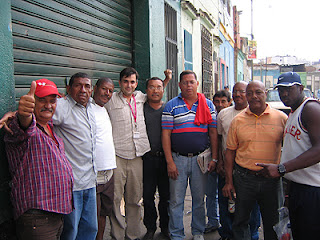
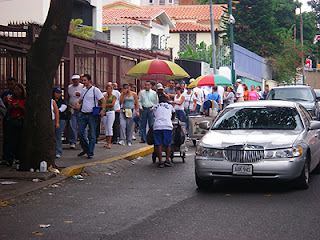
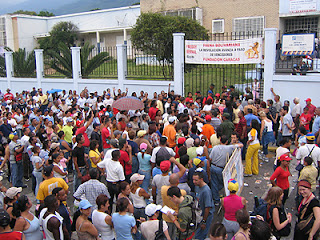
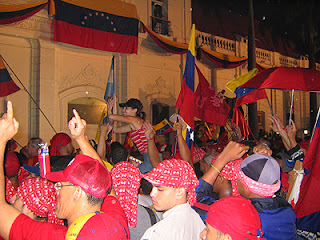
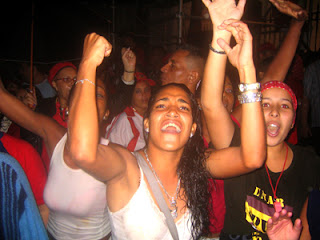
 Please help build the campaign by
Please help build the campaign by